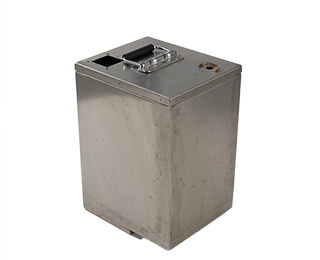2024-04-09 09:54:39
In the realm of electrical enclosures, the material of the Box Shell plays a crucial role in ensuring the safety, durability, and functionality of the enclosed components. Stainless Steel Electrical Box Shells stand out as a premier choice, offering a blend of robustness, corrosion resistance, and aesthetic appeal.

Benefits of Stainless Steel Electrical Box Shells
1. Corrosion Resistance
Stainless steel is renowned for its exceptional resistance to corrosion, making it an ideal material for electrical enclosures in environments exposed to moisture, chemicals, or extreme temperatures. This resistance ensures longevity and reliability, particularly in industrial and outdoor applications.
2. Durability
The inherent strength of stainless steel provides excellent protection against physical damage. This durability is crucial in safeguarding sensitive electrical components from impacts, vibrations, and other mechanical stresses.
3. Hygiene and Cleanliness
Stainless steel is non-porous and easy to clean, making it a preferred choice in industries where hygiene is paramount, such as food processing, pharmaceuticals, and healthcare. Its ability to maintain a sterile environment prevents contamination and ensures compliance with stringent health standards.
4. Aesthetic Appeal
Beyond its functional benefits, stainless steel offers a sleek and modern appearance. Its reflective surface can enhance the visual appeal of electrical installations, particularly in commercial and architectural applications where aesthetics matter.
5. Fire Resistance
Stainless steel's high melting point provides an additional layer of protection in the event of a fire. It does not easily deform or burn, helping to contain and isolate electrical fires, thus enhancing overall safety.
Applications of Stainless Steel Electrical Box Shells
1. Industrial Settings
In manufacturing plants, chemical processing facilities, and refineries, the harsh environmental conditions demand enclosures that can withstand corrosive agents and mechanical stress. Stainless steel electrical box shells are ideal for these settings due to their robustness and resistance to corrosion.
2. Outdoor Installations
For electrical installations exposed to the elements, such as telecommunications equipment, traffic control systems, and renewable energy installations, stainless steel provides reliable protection against rain, UV radiation, and fluctuating temperatures.
3. Marine Environments
The maritime industry faces unique challenges with saltwater exposure, which can rapidly corrode standard materials. Stainless steel's superior corrosion resistance makes it a preferred choice for electrical enclosures on ships, offshore platforms, and coastal facilities.
4. Food and Beverage Industry
In environments where hygiene is critical, such as food processing plants and breweries, stainless steel electrical box shells help maintain cleanliness and prevent contamination, ensuring compliance with health and safety regulations.
5. Healthcare Facilities
Hospitals, laboratories, and pharmaceutical manufacturing require enclosures that can be easily sanitized. Stainless steel's non-porous surface and resistance to disinfectants make it an ideal material for these applications.
Considerations for Selection
1. Grade of Stainless Steel
Different grades of stainless steel offer varying levels of corrosion resistance and mechanical strength. Common grades used for electrical enclosures include 304 and 316 stainless steel. Grade 316 is often preferred in more corrosive environments due to its higher molybdenum content, which enhances its resistance to chlorides.
2. Size and Configuration
The size and configuration of the electrical box shell should be chosen based on the specific requirements of the installation. Considerations include the number of components to be enclosed, the need for cable entry points, and space for heat dissipation.
3. Ingress Protection (IP) Rating
The IP rating indicates the level of protection against dust and water ingress. For outdoor or washdown applications, a higher IP rating (e.g., IP66 or IP67) ensures better protection against environmental factors.
4. Customization Options
Many manufacturers offer customization options for stainless steel electrical box shells, including mounting brackets, cutouts for switches and displays, and specialized coatings. Customization can enhance the functionality and integration of the enclosure with other systems.
5. Cost Considerations
While stainless steel enclosures may have a higher initial cost compared to other materials, their durability and low maintenance requirements can result in long-term cost savings. Evaluating the total cost of ownership is essential when selecting an enclosure.
Stainless steel electrical box shells represent a premium solution for protecting electrical components in a wide range of applications. Their unmatched corrosion resistance, durability, and aesthetic appeal make them a valuable investment for ensuring the reliability and safety of electrical systems. By considering factors such as the grade of stainless steel, size and configuration, IP rating, customization options, and overall cost, one can select the optimal stainless steel enclosure for their specific needs. Whether in industrial, outdoor, marine, food and beverage, or healthcare environments, stainless steel electrical box shells offer unparalleled performance and longevity.